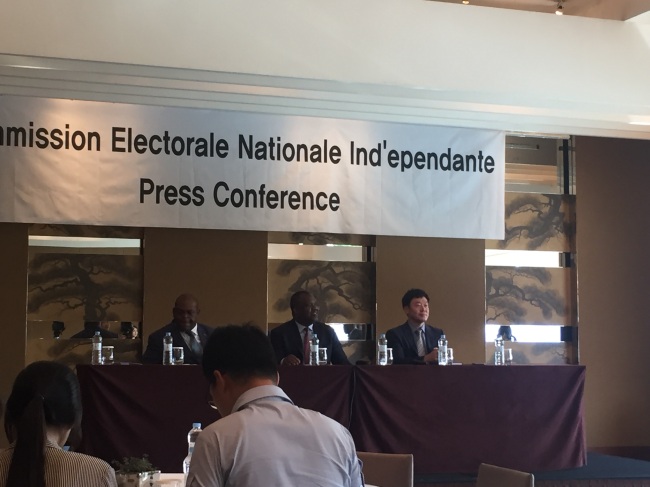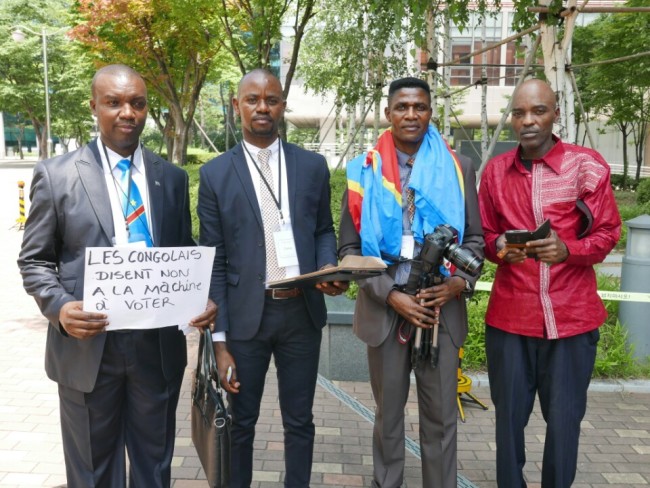 |
Corneille Nangaa, the head of the electoral commission of the Democratic Republic of Congo (center) speaks during a press conference in Seoul, Tuesday. (Claire Lee/ The Korea Herald) |
“But I can say that they only account for a very small proportion of our population. Such groups only consist of 10, 15 people each, and have expressed groundless ideas without solid evidence.”
The upcoming election in Congo seeks to end the troubled Central African nation’s political crisis, which has given rise to deadly protests. Much of the violence that has plagued the country is linked to incumbent President Joseph Kabila, who has stayed in power beyond his constitutionally mandated two-term limit by deliberately delaying elections.
The controversial Korean company, Miru Systems, is supplying some 105,000 machines to Congo as part of a $150 million contract. Critics of the deal, including the US, Congolese activists and Human Rights Watch, say the machines carry a high risk of undermining the reliability of the upcoming vote, as millions of people there are illiterate and lack access to electricity.
On Monday, just a day before Nangaa’s press conference, some 22 pro-democracy activists in Congo were violently detained by the police in Kinshasa, for staging a peaceful protest against the introduction of the Korean-made machines, in front of the building of the electoral commission, according to news reports.
Nangaa’s claims made Tuesday -- that only a few Congolese are against his electoral body’s decision to use the machines -- are also dramatically different from the results of a recent survey released by Congo Research Group, a New York-based NGO focusing on research projects on conflicts in Congo.
According to the opinion poll, which consisted of some 1,100 phone interviews of Congolese citizens living across 26 provinces in the country in July, 62 percent of the participants said they do not trust that Congo’s National Independent Electoral Commission (CENI), headed by Nangaa, to “carry out free and fair elections.” At the same time, 45 percent said that if President Kabila’s candidate gets elected, they would “not accept the results.”
In February, US Ambassador to the United Nations Nikki Haley warned Congolese authorities to use paper ballots or lose American support for the polls. Last month, five Congolese political activists residing in Korea filed a complaint with the Korean NEC, asking the Korean government to prohibit Miru Systems from supplying the machines to Congo.
In response to the matter, Nangaa said overseas-based Congolese activists who have spoken up against the machines account for a “small number of the Congolese population” and they “don’t have the right to vote.”
“Most of the countries that have made negative remarks against Congo using the machines are (countries) that have attempted to export their own electronic devices for the Congolese election but failed,” he said, adding that he would not specify which countries he meant.
“For non-Congolese people, who won’t be affected by the Congolese domestic politics and elections, to speak on Congo and its politics, at its core, I think is a form of foreign interference. We would like to hold the upcoming election as independently and peacefully as possible.”
Meanwhile, the Korean firm, as well as Korea’s National Election Commission, have been linked to a number of serious corruption allegations at home and overseas. Miru’s deal with Congo’s CENI was partially arranged by A-Web, a Korean NGO almost entirely funded by the Korea NEC, which connects Korean tech firms to foreign electoral bodies worldwide.
Kim Yong-hi, who served as the head of both A-Web and Korea’s NEC, is currently under investigation by prosecutors on allegations of embezzlement and bribery, among others. Miru’s machines have also caused controversies in other developing democracies, including Iraq and Argentina.
 |
Bwelungu Nombi Henry (left), a Congolese activist living in South Korea, protests against Miru Systems, a Korean firm that has signed a deal to supply its controversial voting devices to Congo`s upcoming election in December, in Pangyo, Gyeonggi Province, on July 16. (Claire Lee/ The Korea Herald) |







![[Today’s K-pop] Blackpink’s Jennie, Lisa invited to Coachella as solo acts](http://res.heraldm.com/phpwas/restmb_idxmake.php?idx=644&simg=/content/image/2024/11/21/20241121050099_0.jpg)